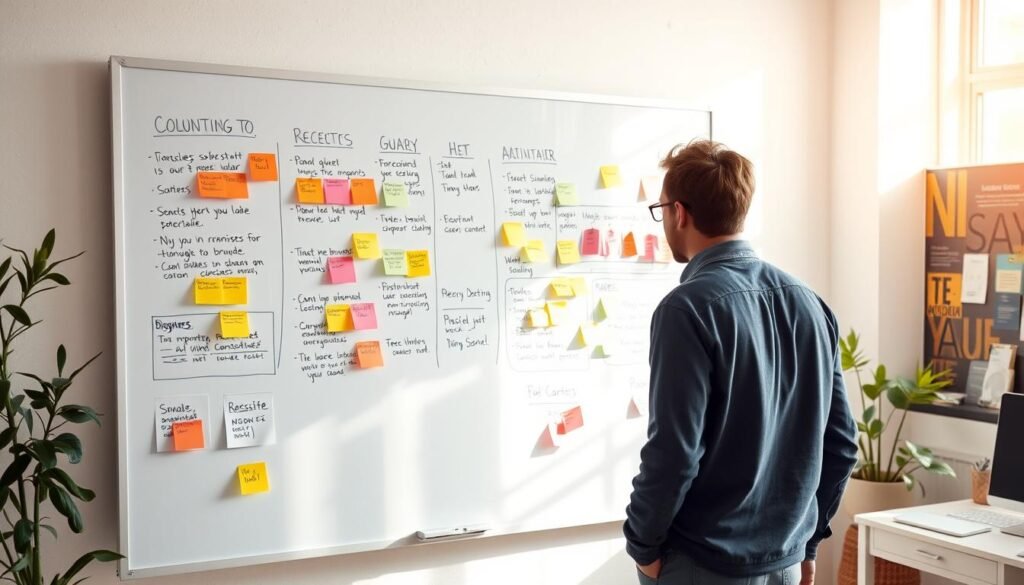Mastering Self-Discipline: Keys to Success
Self-discipline is key to success in life, from personal goals to work achievements. Plato said, “The first and best victory is to conquer self.” People with self-discipline are happier and more fulfilled. They achieve more of what they truly want.
This article will show you how to master self-discipline. You’ll learn practical strategies and mindset shifts to unlock your full potential.
Those with more self-control make quicker decisions. They choose actions that match their values and goals. Self-discipline is a skill you can learn with daily practice.
Having a clear plan is essential to reach your goals. Break down new habits into small, achievable steps. This makes it easier to stick to them.
The Power of Self-Discipline
Self-discipline is a powerful tool that helps you lead yourself and others better. Marcus Aurelius said, “You have power over your mind—not outside events. Realize this, and you will find strength.” Stoic philosophers like Plato and Marcus Aurelius teach us about the value of self-control and focusing on what we can control.
By mastering self-discipline, you can control your impulses, make decisions, and feel proud of your achievements. Studies show that self-control is key for reaching daily goals by resisting short-term temptations. A study on middle school students found that self-control led to better grades, less absence, and more study time.
Quotes and Insights from Stoic Philosophers
“The universe is change; our life is what our thoughts make it.”
– Marcus Aurelius
“The soul becomes dyed with the color of its thoughts.”
– Marcus Aurelius
Building self-discipline and mental toughness helps you stay focused and reach your goals. By practicing mindfulness and staying present, you can gain the willpower for a more fulfilling life.
Self-discipline is a key strength that greatly impacts your life. By following Stoic philosophy and improving your self-control, you can reach your full potential and succeed in life’s challenges.
Understand Your Strengths and Weaknesses
Mastering self-discipline starts with knowing your strengths and weaknesses. By spotting where you shine and where you falter, you can chart a path for growth. Self-awareness is the key to reaching your full potential and stepping out of your comfort zone.
Begin by examining your habits, actions, and thoughts closely. What tasks do you find easy, and which ones do you shy away from? Be honest about your weaknesses to start improving them. Accepting your flaws is the first step to building the self-discipline needed to reach your goals.
After you know your strengths and weaknesses, you can make a plan to build self-control and develop self-awareness. This might mean finding mentors, getting accountability partners, or using specific strategies to tackle your weaknesses. The important thing is to be patient, persistent, and open to growth.
| Strengths | Weaknesses |
|---|---|
| Time management | Procrastination |
| Task prioritization | Lack of focus |
| Discipline in exercise | Emotional regulation |
| Budgeting and saving | Impulse control |
By understanding and embracing your personal strengths and weaknesses, you can start expanding your comfort zone and mastering self-discipline. This self-awareness is the base for your journey to success and personal growth.
https://www.youtube.com/watch?v=Zm9cZf4I8nY
Eliminate Temptations and Distractions
Removing temptations and distractions is key to cultivating discipline habits and enhancing productivity. As Oscar Wilde said, “I can resist anything except temptation.” By eliminating easy access to unhealthy habits or time-wasting activities, you can improve your focus and self-control.
Create an Environment Conducive to Focus
Creating a space that supports productivity and discipline is crucial. This may involve:
- Designating a distraction-free workspace
- Minimizing distractions by limiting social media access and other digital temptations
- Organizing your physical space to promote focus and concentration
- Eliminating clutter and visual distractions
- Implementing strategies like the Pomodoro Technique to manage your time effectively
| Strategy | Benefit |
|---|---|
| Designating a distraction-free workspace | Enhances focus and concentration |
| Limiting social media and digital distractions | Minimizes distractions and improves time management |
| Organizing physical space | Promotes a sense of order and cultivates discipline habits |
| Implementing time management techniques | Enhances productivity and helps achieve goals |
By eliminating temptations and creating a supportive environment, you can stay focused and on track. This will enhance your overall productivity and success.
Set Clear Goals and Have an Execution Plan
Success often depends on setting clear goals and making a detailed plan. Without a clear vision and a roadmap, it’s easy to get lost. You might find yourself distracted by things that aren’t important.
Begin by breaking down big goals into smaller tasks. This makes your goals seem less overwhelming. It also helps you focus on what’s most important. Use time-blocking to give your top priorities your full attention.
- Make your goals specific, measurable, achievable, relevant, and time-bound (SMART).
- Develop a detailed plan that shows how to reach your goals. Include deadlines and how you’ll use your resources.
- Sort your tasks by how urgent and important they are. Start with the most critical ones.
- Use tools and strategies that help you work more efficiently. This way, you can make the most of your time.
By setting clear goals and having a solid plan, you stay motivated and focused. This powerful combo helps you make steady progress. It also helps you overcome any challenges you face.
“A goal without a plan is just a wish.” – Antoine de Saint-Exupéry

Remember, self-discipline is key to building your dreams. Use goal-setting and planning to reach your full potential. This will help you achieve the success you want.
Cultivate Daily Diligence
Building discipline habits is a lifelong journey, not a quick fix. It takes daily diligence to improve self-discipline. By adding self-discipline-building activities to your daily life, you can grow your willpower. This lets you reach beyond your comfort zone and hit your goals.
It could be a daily workout, meditation, or finishing a work task. Consistency is crucial for boosting productivity and building discipline habits. These habits keep you focused and build your self-confidence. This makes your self-discipline even stronger.
Self-discipline isn’t innate; it’s learned with effort and commitment. By practicing daily diligence, you build the strength to face challenges. This helps you reach your long-term goals.
“The secret of getting ahead is getting started. The secret of getting started is breaking your complex overwhelming tasks into small manageable tasks, and then starting on the first one.” – Mark Twain
Mastering Self-Discipline
Mastering self-discipline is a journey of growth and improvement. It’s not about being restricted, but about empowering yourself to reach your highest potential. By following the strategies in this article, like setting clear goals and eliminating distractions, you can turn self-discipline into a powerful tool for success.
Self-discipline isn’t about being perfect. It’s about being resilient and learning from mistakes. Embrace the journey, celebrate your progress, and watch self-discipline become the foundation of your achievements.
Research highlights the importance of setting clear goals for self-discipline. It helps you navigate your path effectively. Prioritizing tasks and using time-blocking can boost your discipline and productivity.
Creating a solid daily routine is essential for discipline. It helps you stay focused on important tasks. Developing willpower through good habits makes better choices and strengthens self-discipline.
Mental health and self-care are also key. Mindfulness and enough sleep support your self-discipline efforts. Avoiding temptations and distractions helps you stay focused on your goals.
Persistence and consistency are vital for long-term self-discipline. Remember, self-discipline is a skill that grows with time. With the right mindset and strategies, you can achieve personal growth and success.
Establish New Habits and Rituals
Starting to be more disciplined often means making new habits and rituals. Don’t try to change everything at once. Start with one new discipline-building habit at a time. This way, you can build up your self-discipline gradually.
Break Down Goals into Manageable Steps
To reach your goals, break them down into smaller tasks. Think of it like eating an elephant one bite at a time. By doing this, you can enhance your productivity and create daily routines that help you reach your goals.
- Identify your main goal and break it down into specific, doable steps.
- Set deadlines for each step to keep yourself on track and accountable.
- Celebrate your small victories to stay motivated and keep up your discipline habits.
Consistency is crucial. By creating daily routines and breaking down goals into smaller tasks, you can build the self-discipline needed to achieve your dreams.
“We are what we repeatedly do. Excellence, then, is not an act, but a habit.” – Aristotle
Shift Your Perception of Willpower
Your view of willpower greatly affects your self-discipline. If you think you have little willpower, you might hold yourself back. But, seeing willpower as unlimited lets you reach new heights and succeed more.
Think big and challenge the idea that your self-control is fixed. Believing in your ability to stay disciplined boosts your motivation and mental toughness. This helps you move closer to your goals.
Recent studies show willpower might not be limited, as many thought. They found that with the right mindset, you can build and maintain self-control. People like Kobe Bryant and Rosa Parks show the power of willpower in achieving big goals.
By seeing your willpower in a positive light, you can improve your self-discipline and mental toughness. This helps you face challenges and achieve more in life. Your beliefs about yourself can change your reality. So, pick a mindset that helps you develop willpower and change your mindset for success.

“Willpower provides the resilience to overcome difficulties and achieve goals.” – American Psychological Association
To boost willpower, use positive thinking and motivation. Create good habits and believe in your ability to reach goals. By cultivating mental toughness and enhancing self-discipline, you can reach your full potential and make progress towards your dreams.
Have a Backup Plan
When you’re working on self-discipline, having a backup plan is key. It’s not about expecting failure, but being ready for any hurdles. By using the “implementation intention” method, you can make a plan for tough times.
This strategy saves you energy and keeps you in control. It helps you face challenges with strength and flexibility. Knowing you have a plan keeps you focused on your goals.
Having a backup plan is vital for enhancing self-discipline. It helps you overcome obstacles and keeps your progress on track. By developing contingency plans, you stay committed to your goals, even when things get tough.
It’s important to be ready for the unexpected, not just failure. By implementing “implementation intention”, you can map out how to handle challenges. This keeps your self-discipline strong and helps you reach your goals.
| Benefits of Having a Backup Plan | Strategies for Developing Contingency Plans |
|---|---|
|
|
Seek Guidance from Coaches and Mentors
Having the right support system can really help you master self-discipline. Look for coaches, mentors, or accountability partners who offer feedback and challenge you. They help you stay on track with your goals.
Learning from those who’ve already mastered self-discipline can speed up your journey. Don’t shy away from honest feedback, as it’s key for growth and discipline.
The Power of Finding Accountability Partners
Accountability partners are crucial for developing self-discipline. They keep you on track, celebrate your wins, and support you through tough times. Working with one helps build lasting habits and consistency.
The Expertise of Coaches and Mentors
Coaches and mentors bring a wealth of knowledge to the table. They provide personalized advice, strategies, and new views on challenges. Their guidance helps you tackle the core of your self-discipline issues.
| Testimonial | Impact |
|---|---|
| “Under Harris Kern’s guidance, our sales grew by over 12%.” | Significant business growth |
| “In 18 months, our monthly revenue grew from $20k to $120k with Harris Kern’s coaching.” | Dramatic revenue increase |
| “Harris Kern helped us develop self-discipline and hire 5 new employees.” | Enhanced self-discipline and business expansion |
These stories show how coaches and mentors can change lives and businesses. Their guidance can unlock your potential and help you grow in self-discipline.
Don’t go on the self-discipline journey alone. Use the help and wisdom of coaches, mentors, and accountability partners. They can speed up your progress and help you reach your goals.
Forgive Yourself and Move Forward
As you work on improving your self-discipline, remember to forgive yourself. Everyone faces challenges and makes mistakes. It’s important to learn from these experiences and grow stronger.
Research shows that blaming yourself can lead to anxiety and depression. This highlights the need for self-compassion. By following the four Rs of self-forgiveness, you can break free from self-criticism and move forward with confidence.
Resilience in the Face of Setbacks
Setbacks are chances to improve and become more resilient. When you face a challenge, take a moment to reflect and plan again. A SEAL buddy showed how quickly moving on from failure can build resilience.
Compassion-Focused Therapy helps develop the skills needed for self-forgiveness. These skills include empathy and nonjudgment. By practicing these, you can overcome setbacks and move forward with determination.
| Key Insights on Self-Forgiveness | Impact |
|---|---|
| Enright and colleagues’ definition of self-forgiveness | The release of negative emotions directed towards the self, the cultivation of positive emotions towards the self, and an acceptance of responsibility. |
| Cornish and Wade’s four Rs of self-forgiveness | Responsibility, Remorse, Restoration, and Renewal. |
| Griffin, Worthington, Bell, and Davis’ aims for self-forgiveness | Acknowledging responsibility and reaffirming one’s worth. |
| Compassion-Focused Therapy’s core competencies | Attention sensitivity, sympathy, distress tolerance, empathy, and nonjudgment. |
Remember, overcoming setbacks, practicing self-forgiveness, and developing resilience are key to improving self-discipline. Embrace the journey, learn from your experiences, and keep moving forward with purpose and self-acceptance.
Strategies for Building Self-Discipline
Mastering self-discipline is a lifelong journey. It involves using various strategies to improve your habits and mindset. This helps boost your productivity, mental toughness, and self-control. Each step, from avoiding distractions to starting new routines, strengthens your willpower and helps you achieve your goals.
Setting clear, measurable goals and making a detailed plan is crucial. Breaking down big goals into smaller steps makes success feel more reachable. It also helps you feel a sense of progress and self-discipline.
Creating an environment that helps you focus is also key. Remove distractions and organize your space. This makes it easier to stay on track.
Building daily diligence through new habits and rituals is vital. This could be a morning routine, a regular workout, or dedicated time for deep work. These habits show your commitment and resilience when faced with challenges. Remember, self-discipline is about empowering yourself to reach your highest potential and meet your goals, both personally and professionally.







